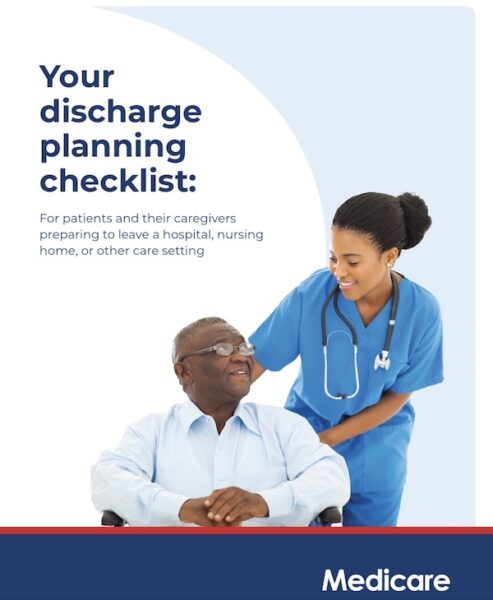The most dangerous part of a hospital stay often isn't the surgery or the illness – it's the transition home. A rushed or unclear discharge can lead to confusion, medication errors, and a fast return to the hospital. But this risk is largely preventable.
With the proper preparation, you can turn a potentially stressful discharge into a smooth launchpad for a successful recovery. This hospital discharge checklist is your game plan to ensure that nothing is overlooked and your loved one receives the safe, supported, and fresh start they deserve.

Preparing for Hospital Discharge is Essential for Recovery
After a hospitalization, older adults often require additional care to ensure a smooth recovery. A successful hospital discharge helps them stay on track and regain as much independence as possible.
Preparing before they leave the hospital will make a significant difference in an older adult’s healing.
That's because many of the issues that cause problems with recovery could be prevented if you’re both well-prepared for hospital discharge. But unfortunately, the hospital discharge process is often rushed and confusing.
It can be challenging to obtain clear information from doctors and nurses, and you may not know which questions to ask.
That’s why studies show that 40% of patients over 65 had medication errors after leaving the hospital.
Even worse, 18% of Medicare patients discharged from a hospital were readmitted within 30 days.
To reduce the risk of these problems affecting your older adult, we found a helpful free hospital discharge checklist from Medicare that covers key questions to ask doctors, nurses, and social workers.
We explain what being discharged really means for someone’s health, what a successful discharge is, why many seniors aren’t prepared to leave the hospital, how a hospital discharge checklist improves recovery, and how to get seniors to accept the help they need.
What does Hospital Discharge Really Mean?
When someone is discharged (released) from the hospital, it means their doctor has determined that they’ve recovered enough to require hospital-level care no longer.
It doesn’t mean they’re fully recovered.
Although your older adult can leave the hospital, they will still require additional care. They may even need intensive care for weeks or months.
Some people are well enough to get proper care and rehab at home (like physical therapy). Others may need a short-term stay in a skilled nursing facility.
Click to Download – Hospital Discharge Planning Checklist
What Defines a Successful Hospital Discharge?
A successful hospital discharge means that your older adult leaves the hospital and continues their recovery without significant problems.
Why is Hospital Discharge So Challenging?
Hospital discharge nurses are often overloaded and unable to spend enough time helping patients and their families understand the key information about post-hospital recovery.
That’s why it’s essential to be a strong advocate and ensure you both have all the necessary information before leaving the hospital.
How a Hospital Discharge Checklist Improves Recovery
Being prepared for the next step in care, whether it’s at home or in a skilled nursing facility, is essential for a smooth recovery.
Medicare has a free hospital discharge checklist that covers the essential things you’ll need to know before your older adult leaves the hospital.
It lists key questions to ask about follow-up care, potential issues to watch for, medications, required equipment and supplies, and more.
Having a checklist helps you identify the necessary information, services, and resources for recovery before leaving the hospital.
After you leave, it becomes much more challenging to obtain helpful answers.
Encourage Seniors to Ask for Help During Recovery
A critical part of a strong recovery is making sure your older adult follows the doctor’s instructions.
Some people may have unrealistic expectations about what they can do on their own after leaving the hospital.
If that’s happening, ask a doctor or nurse to explain to both of you what your older adult will actually be able to do on their own and what will be impossible.
Hearing directly from a medical professional is an effective way to convince seniors to accept the help they need.
It also helps ensure they have what they need to support their recovery.
Recommended for you:
- 7 Tips for Helping Seniors at the Doctor: Being a Health Advocate
- Delirium Is Often Mistaken for Dementia: Know the Signs
- 3 Ways to Get the Home Medical Equipment That Seniors Need: Wheelchairs, Hospital Beds, and More
About the Author

Connie is the founder of DailyCaring.com and was a hands-on caregiver for her grandmother for 20 years. (Grandma made it to 101 years old!) She knows how challenging, overwhelming, and all-consuming caring for an older adult can be. She also understands the importance of support, especially in the form of practical solutions, valuable resources, and self-care tips.















Hospital discharge is indeed a critical time for families to be involved and proactive.
I especially like the caregiver resources at NextStepInCare.org
http://www.nextstepincare.org/
They were developed by the non-profit United Hospital Fund, in close partnership with many of the country’s experts in caregiving and discharge transitions.
Thanks Dr. Kernisan, this is a great resource. I really like the Hospital-to-Home Discharge Guide (http://www.nextstepincare.org/uploads/File/Guides/Hospital/Hospital_to_Home_Guide/Hospital_to_Home.pdf). Lots of useful information that explains what’s happening and how to get help, if needed.